|
5) Spetters ( Paul Verhoeven, 1980 )
|
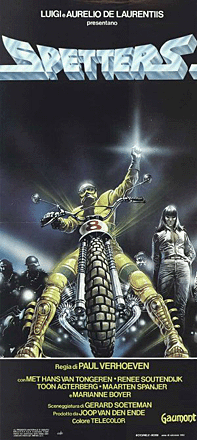 |
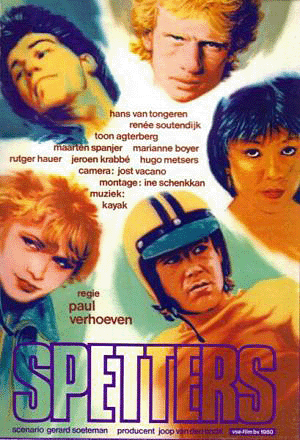 |
|
Italian film poster of Spetters
|
Dutch film poster of Spetters
|
After five box-office hits with producer Rob
Houwer, Paul Verhoeven longed for a more personal film with a subject
closer to his heart. He was also a little tired of Houwer's narcissistic
behavior: "He (Houwer red) drew all attention to himself. Rob
Houwer presents a Rob Houwer film, produced by Rob Houwer and directed by Paul
Verhoeven, that's Rob's vision of life." Joop van de Ende gave him the
opportunity to develop and so Gerard Soeteman, Verhoeven's regular
screenwriter in the Netherlands, wrote the screenplay for >
Spetters: the harsh adventures of
five young people who fight their way through life.
The first version was rejected by the
production fund: perverse, vulgar, outrageous were some of their
qualifications. Van den Ende had a fit of rage, hit his fist on the table and
forced the committee to promise that a second version would have an honest
chance. The intimidation had its effect and the grant was provided based on
the second version. Then Verhoeven, hurt and vengeful, secretly made his film
based on the first screenplay.
The result, with the sex scenes, the violence
and a brutal gay gang rape sequence, was indeed very risky. During a t.v. show
of Sonja Barend director Verhoeven was bombarded with moral objections. Some
political left parties were so outraged by the misogynistic aspect of the
movie that they formed an anti-Spetters committee. Verhoeven tried to
parry the criticism by explaining that young people have to undergo a hard
struggle to stay upright but that did all fall on deaf ears. The overall
attention worked strongly in favor of the producer. Spetters attracted
as many as 1,1 million people.
Spetters
has good performances especially by the talented newcomer Hans van Tongeren
(who like his character Rien committed suicide shortly after the film was
released) and Reneé Soutendijk as the opportunistic temptress, Fientje.
|
4) Soldaat Van Oranje ( aka. 'Soldier of Orange' )
( Paul Verhoeven, 1977 )
|
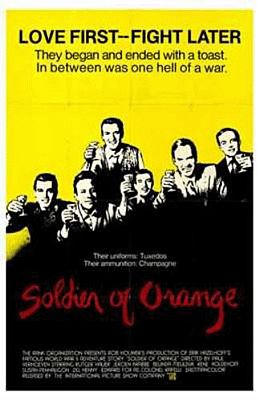 |
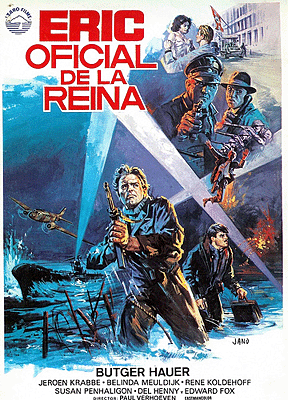 |
|
UK film poster
of Soldier of Orange
|
Spain film poster with spelling error (Butger
Hauer)
|
The most expensive Dutch movie of all time,
proclaimed producer Rob Houwer. No less than 5 million Dutch guilders (Euro
2.25 Million), the amount that was spent on the epic war movie >
Soldier
of Orange based on the
novel by Erik Hazelhoff Roelfzema. As a student, Hazelhoff Roelfzema had
witnessed the outbreak of war, managed to escape to London, climbed up the
army promotional ladder and finally became the adjutant of the Dutch Queen
Wilhelmina.
Director > Paul Verhoeven
and screenwriter Gerard Soeteman reworked the story into an adventure film set
against the backdrop of World War II. Rob Houwer used the labor-intensive
recording period for a smashing publicity campaign, while Verhoeven was like a
general leading his troops. Flawlessly he portrayed the students' society
where the outbreak of the war was perceived as the start of an exciting
adventure. And with stylish display of power he followed the adventures of a
group of students, with Rutger Hauer and Jeroen Krabbé in front. Student-like
jokes and vulgar effects alternated at high speed, while the constant threat
of war granted tenderness towards some of the more intimate moments.
Soldier of Orange
initially received mixed reviews. Some critics complained about the apparent
lack of depth in the film and were annoyed by the sensationalism. Only later,
when the film was well received abroad the respect for Verhoeven's
craftmanship increased and many a man had to admit that there probably was
more hidden underneath the surface.
The public was not impressed with the initial
chagrin: and even when the 'millionth' visitor appeared to be a hired model
employed by producer
Rob Houwer, the visitors continued to rise. Eventually
more than 2 million people went to see Soldier of Orange on the big
screen.
3) Simon ( Eddy Terstall, 2004 )
|
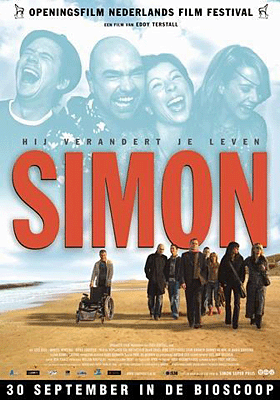
|
|
Dutch film poster of the film Simon
|
The > film
Simon tells the story of the improbable
friendship between the charismatic filibuster and hash dealer Simon and the
timid homosexual dental student Camiel. During a shared holiday their
friendship is put to the test, after which they lose sight of each other. When
they meet again after fourteen years by incident, Simon appears to be ill.
Simon is
an honest and realistic tragicomedy on a difficult subject intelligently
directed by Eddy Terstall working with a modest budget (approx. 1 million
euro) and a lot of his regular cast. Besides the often witty and popular
dialogue Terstall gave his actors room to improvise allowing the dialogue to
flow naturally which adds to the authenticity of the characters Most scenes
were filmed in a smart progression of 'objective' medium shots framed in
sophisticated compositions which leads to a decrease in sentimentality.
As with all character-driven plots a film
stands or falls with the acting and in that respect Simon delivers with
great performances by the entire cast (especially Cees Geel as Simon and Rifka
Lodeizen as his girl-friend Sharon). The film Simon won four Gouden
Kalveren (a prestigious Dutch film prize) for Best Film, Best Director,
Best Actor and the Tiscali Publieksprijs (audience) on the Nederlands
Filmfestival .
2) Spoorloos ( aka. 'The Vanishing' ) ( George
Sluizer, 1988 )
|
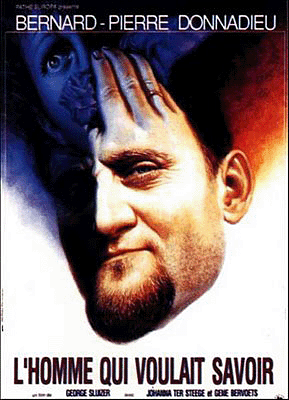
|
|
French film poster of Spoorloos
|
From the long preamble to the final production
of > Spoorloos
director Sluizer had to overcome some setbacks mainly caused by the lack of
interest from production companies in the project. Eventually he decided to
produce the film himself (Golden Egg Film/ Ingrid Productions) and Pieter
Goedings of film distributing company The Movies was prepared to issue
two film copies.
So now Sluizer could start and with the hand of
a true thriller master he tells the story, adapted from Tim Krabbe's novel Het
Gouden Ei (aka. 'The Golden Egg'), of a man who loses his girlfriend
during a vacation in France. Also his handling of the international cast was
impressive, they acted with a natural ease like there had been no rehearsals.
It was like they were playing something out of their own life. The result, a
carefully constructed psychological thriller with compelling performances
(Bernard-Pierre Donnadieu is excellent as the kidnapper) and one of the most
haunting dénouements in thriller history that runs counter to all laws of
commercial filmmaking which proclaims a happy end.
Although Spoorloos had very good reviews
in the Netherlands and also at foreign festivals (actress >
Johanna ter
Steege won the European Oscar in
Berlin) were it was issued as The Vanishing, the film was not a
downright blockbuster at first. Although 100,000 visitors is an acceptable
score to Dutch standards. Subsequently The Vanishing became a long-term
international success. When it was released in London on May 1990, the rather
chauvenistic British film press embraced the film resulting in a spot on the
top 10 list of most visited films of that month.
Because of The Vanishing's international
cult reputation it drew the attention of the large production company Twentieth
Century Fox which gave George Sluizer the opportunity (he also owned the
film rights) to produce a remake. Fox engaged the quite popular actor
Jeff Bridges for the role of the kidnapper and the prominent screenwriter Todd
Graff whose main task was to invent a new ending acceptable to an American
audience. When the film was released in Hollywood the reviews were unanimously
bad because American film critics were all admirers of the original The
Vanishing and were unimpressed by this characterless and bland remake.
Therefore the film had a short life in American theatres.
Click here to find the >
number one Dutch
Movie of this Top 10 !